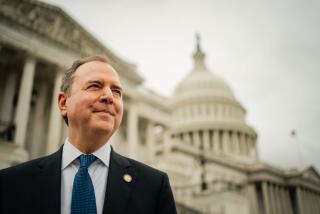National Perspective : Senate Openings
- Share via
Sen. Alan K. Simpson’s announcement that he will retire rather than run for another term brings to 12 the number of Senate seats that will be open in next year’s election, a 20th-Century record. A 13th seat, the one vacated by Sen. Bob Packwood (R-Ore.), will be filled by a special election on Jan. 30. Overall, 33 seats will be up for grabs next year, including 18 held by Republicans and 15 by Democrats. In part because of the retirements, the Democrats have virtually no chance of recapturing the Senate, but on the other hand, the Republicans have almost no shot at gaining the six seats needed for a filibuster-proof Senate, says political analyst Charles Cook. “The Democrats are having a bad year, but not as bad as the overall numbers suggest. It’s bad, not horrendous.”
****
(Green) Indicates an open Senate seat
Oregon
Wyoming
Colorado
Nebraska
Kansas
Louisiana
Arkansas
Illinois
Alabama
Georgia
New Jersey
Current Senate Split
GOP: 53 seats
Democrats: 46 seats
Vacant*: 1 seat
* Senate one seat short due to Packwood resignation.
REPUBLICANS
Nancy Kassebaum, 63 (Kan.)
Kassebaum is a moderate on social issues, particularly a solid abortion rights voting record and support for sanctions against South Africa, but she has been more conservative on economic issues. Kassebaum has been a strong advocate of returning authority over welfare and other social programs to the states.
Primary: August 6.
Likely outcome: Solid Republican
Presidential vote in 1992: Bush (39%)
****
Hank Brown (Colo.)
Considered a moderate, the one-term senator has offered legislation that includes an alternative spending cuts to Clinton’s economic package and a welfare bill that includes work-based reforms and broad leeway for states.
Primary: Aug. 13
Likely outcome: Leans Republican
Presidential vote in 1992: Clinton (40%)
****
Bob Packwood (Ore.)
Packwood was forced to resign Oct. 1 after the Senate Ethics Committee unanimously voted to expels him for sexual and official misconduct. As chairman of the Senate Finance Committee, Packwood tended to favor free trade and lower taxes.
Likely outcome: Tossup
Presidential vote in 1992: Clinton (43%)
****
Alan K. Simpson, 64, (Wyo.)
After 18 years in the Senate, Simpson has a voting record that has offended and delighted both liberals and conservatives. He supports abortion rights and nuclear power and is against the Endangered Species Act. Last year, Simpson was ousted as the Republican Senate whip in favor of conservative Trent Lott.
Primary: Aug. 20
Likely outcome: Solid Republican
Presidential vote in 1992: Bus (40%)
****
Mark O. Hatfield, 73, (Ore.)
Hatfield has spend most of his adult life in politics, starting in 1950 with his election as a state representative. He began his Senate career in 1966 and rose to Senate Appropriations Committee chairman. Hatfield’s independent voting record has angered his party throughout his career.
Primary: May 21
Likely outcome: Tossup
Presidential vote in 1992: Clinton (43%)
DEMOCRATS
Howell Heflin, 75, (Ala.)
Heflin is a strong supporter of government programs, a outspoken opponent of NAFTA and backed U.S.-involvement in the Persian Gulf War. As political lines continue to adjust in the South, experts predicted that Heflin would have faced a very tough re-election.
Primary: June 4
Likely outcome: Leans Republican
Presidential vote in 1992: Bush (48%)
****
J. James Exon (Neb.)
Exon is considered a Democratic centrist, voting the party line when his vote is critical. Among his notable achievement is legislation that gives the president the authority to halt foreign takeovers that could threaten national security.
Primary: May 14
Likely outcome: Leans Democratic
Presidential vote in 1992: Bush (47%)
****
Bill Bradley, 52, (N.J.)
Bradley has a fairly liberal voting record, but has also been an outspoken critic of Democrats and President Clinton. When he announced his retirement, Bradley said, “‘politics is broken’ ”
Primary: June 4
Likely outcome: Tossup
Presidential vote in 1992: Clinton (43%)
****
J. Bennett Johnston (La.)
Over his three terms in the Senate, Johnston has amassed one of the most conservative voting records among Democratic senators. He favors opening the Arctic National Wildlife Refugee to oil drilling and was a key player in killing the energy tax in Clinton’s first budget.
Primary: Sept. 21
Likely outcome: Leans Republican
Presidential vote in 1992: Clinton (46%)
****
Sam Nunn, 57, (Ga.)
Nunn has been a leading voice for conservative Democrats and his party’s premier spokesman on defense issues. As chairman of the Senate Armed Services Committee until Republicans gained control of the Senate, Nunn helped forced Clinton to abandon his promise to allow gays to serve openly in the military.
Primary: July 16
Likely outcome: Tossup
Presidential vote in 1992: Clinton (43%) Bush (43%)
****
Paul Simon, 67, (Ill.)
Simon, a presidential candidate in 1988, has been a leading voice in the fight for a balanced budget amendment. He has also been a longstanding advocate of education programs.
Primary: March 19
Likely outcome: Tossup
Presidential vote in 1992: Clinton (49%)
****
Claiborne Pell, 77, (R.I.)
After 36 years in the senate, Pell is perhaps best known for the college student aid grants that bear his name. Pell’s other interests have included a 1992 bill penalizing countries that trade in chemical weapons and strengthen drunk driving laws. He is a former chairman of the Senate Foreign Relations Committee.
Primary: Sept. 10
Likely Outcome: Leans Democratic
Presidential vote in 1992: Clinton (47%)
****
David Pryor, 60, (Ark.)
Pryor was instrumental in establishing the Special Committee on Aging. He is considered Clinton’s best friend in the Senate. Pryor’s retirement gives Republicans a good shot at filling an Arkansas seat for the first time in more than a century.
Primary: May 21
Likely outcome: Tossup
Presidential Vote in 1992: Clinton (53%)
More to Read
Get the L.A. Times Politics newsletter
Deeply reported insights into legislation, politics and policy from Sacramento, Washington and beyond. In your inbox twice per week.
You may occasionally receive promotional content from the Los Angeles Times.










